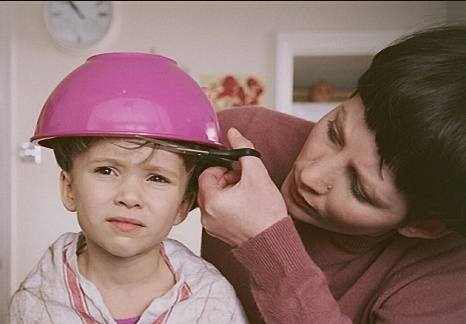Book of the week:
The Sex Myth by Dr Brooke Magnanti.

Which is seriously awesome: imagine
Bad Science, for sex stuff. She examines the evidence for and against various myths around topics such as porn, prostitution, The Sexualisation Of Children and human trafficking - and finds little to back up widely-accepted 'truths' such as the existence sex addiction, of widespread trafficking for sex, of the inherent dangers of watching films of naked consenting adults sexing. It's a great crash-course in evidence-based reasoning, the scientific method and critical assessment of newspaper reports on experimental results - but with jokes! And boobs! Jokes about boobs!
Really. It's ace. It is the epitome of well-written pop science and it will make you cleverer.
...you might want to skip the concluding chapter, though.
The repeated sniping at feminism throughout the book was pretty tiresome. I couldn't really understand the point of it - argue with our ideas, sure, but do you really have to resort to name-calling? Poe-faced this, humourless that! - but all became clear in the last chapter, which is essentially a tirade against Kids These Days doing feminism wrong. Magnanti literally says that she
"turned in [her] metaphorical feminism membership card because ... it sucks to have people write national newspaper columns about how much they not only hate people like you, but also you in particular."
Which is fair enough, actually. People were fucking horrible to her in the papers and on the internet (and I was a bit reluctant to write this piece because I don't want to be the sort of person who makes people stop identifying as feminists because she is so mean to them on the internet). When I read, say,
Renee Martin explaining why she isn't a feminist ("because my life experiences lead me to believe that feminism was not created for women like me"; because feminism has all-too-often ignored the needs of women who aren't white/cis/straight/able-bodied and middle class), I don't have an indignant inner monologue saying, "But
I'm not like that, and
I'm a feminist, therefore you're wrong!". That would be idiotic. But Magnanti is making a similar argument: that feminism has failed sex workers - patronised them, announced that it will Save them, accused them of Suffering From Patriarchal False-Consciousness, advocated for policies that make their lives measurably more dangerous - and then wonders why more aren't queuing up for their metaphorical membership cards. In such circumstances it's not really surprising that she, too, feels that "feminism was not created for women like [her]".
"It's disappointing to find the much-lauded feminist writings of your day have all the depth and insight of a Heat article."
Magnanti dismisses basically all contemporary feminist books as vapid and intellectually shallow, repackaging old ideas and 'stories' rather than presenting new data and analysis. There's an element of truth in this - Sady Doyle has
noted the lack of trail-blazing Theory-Making going on, with most of us spending our time refining and critiquing and prettying up existing theory - but it's quite the generalisation. I don't feel the need to read Jessica Valenti's
Full Frontal Feminism, for example, because it's intended as an introductory text, and I'm past the 101 level. But her 2009 book
The Purity Myth - which brings together data and analysis on contemporary attitudes to sex, virginity, sex education, the sanctification of abstinence, and a whole bunch of other issues - was absolutely fascinating, and a lot more than just a rehash of old ideas.
While I think much of this chapter is off-the-mark - though justifiably and understandably so - she does make some painfully accurate points. For instance, the habit of insisting that "all women are totally feminists! They've just been scared off using the term by the patriarchal media myth-making about how we hate men with our armpits!" - while conducting internal witch-hunts against anyone who's ever dared break the Code of Conduct ("you say you're a feminist but I HEARD YOU USE THE WORD 'LAME' ONCE IN 1997"). Yep: ouch.
My kneejerk response to this chapter was pretty defensive, and possibly idiotic. I felt it wasn't fair to portray contemporary feminism in its entirety as represented by the Poppy Project, Object, and Julie Bindel; as unified in its abhorrence of pornography and sex work, all lined up outside the London Playboy club to harass its employees For Their Own Good. I'm not on board with any of that. I don't know any feminists who are, actually (though I'll happily admit that is a self-selecting and not necessarily representative bunch). The feminists I read, the feminists I hang out with, the feminists I do activism with, are generally on the sex positive side of the fence - as it seems we are now rehashing The Feminist Porn Wars. (What's that line about the definition of insanity? Repeating the same actions over and over and expecting a different outcome?) My point being: there are different opinions within feminism. There are entire ideological divides, in fact; and one of the major ones could be roughly described as Anti-Porn Feminism vs Sex Positive Feminism. In painting All Of Feminism as anti-porn, anti-sex work, anti-science and quite possibly anti-sex, Magnanti wilfully ignores Team Sex Positive Feminism. Because we might undermine her argument.
And come on. Presenting Julie Bindel (who is, I think, the only feminist quoted in the first TWO HUNDRED AND TWENTY TWO PAGES as the representative of All
Feminism Everywhere is lazy and dishonest and about as accurate as - to
take a completely random example out of the blue - presenting the
archetypal drug-addicted sexual-abuse-surviving streetwalker as
representative of All Sex Workers Everywhere.
But then again - she isn't actually obliged to delve that deeply into a movement which has attacked her. Are ladies of colour obliged to read a representative sample of past and present feminists texts before making their decision about whether the movement and its theories are welcoming to people of all ethnicities? Are trans ladies required to undertake watch Feminism, The Movie (dir: me) and to do an ethnographic study to ascertain whether the majority of feminist works are not massively transphobic? Am I expected to survey every Christian text ever to establish whether there is a radical feminist contingent of the right-wing fundamentalist wingnut movement which has as its motto "hey, we're not
all evil harlots"?
No. So why do I expect someone whose direct experience of the feminist movement has predominantly featured feminists shouting at and patronising her because of her work history to dig around until she finds a brand of feminism that
doesn't treat her like crap?




















